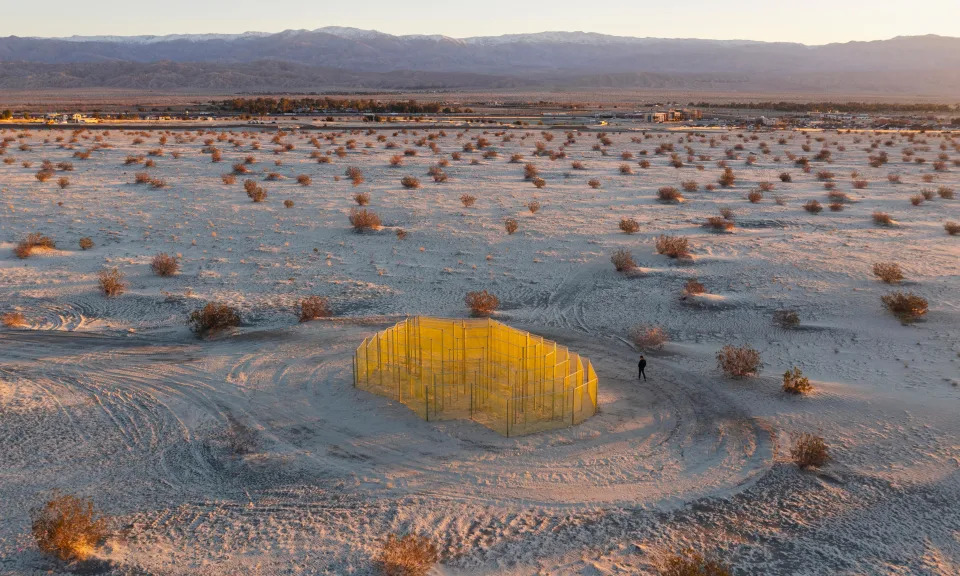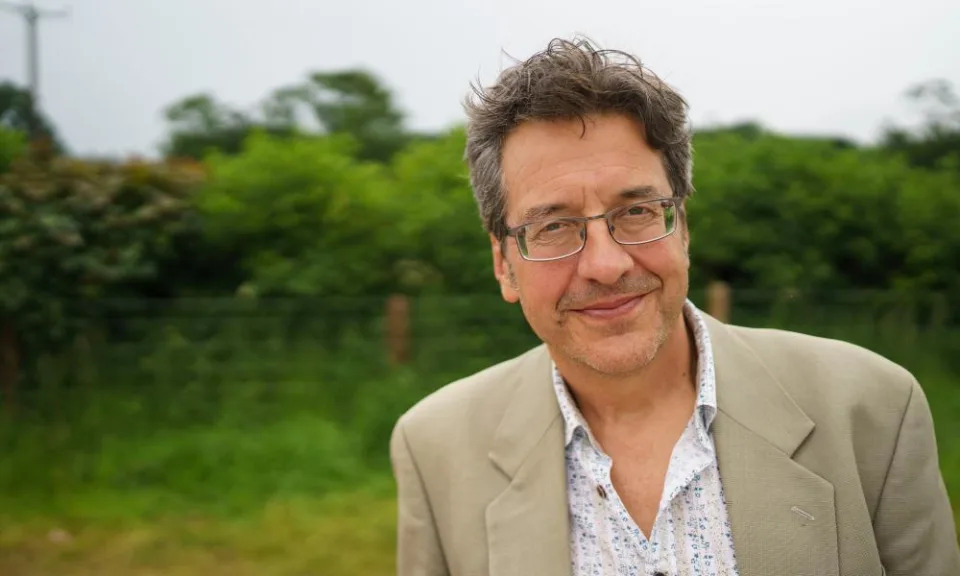Oliver Wainwright
Thu, 9 March 2023

A mountain-shaped cage of yellow metal mesh stands in the desert near Palm Springs, California, looking like a sinister border detention pen. Herds of people mill around inside, as if trying to find their way out of the tortuous enclosure, squeezing their bodies through the narrow passages of this wiry labyrinth as the midday sun beats down. One intrepid figure finally breaks free and begins teetering across the sand in snakeskin heels, back towards the minibus. These are not immigrants trapped in a Trumpian processing centre, but art world luminaries, here to sample the latest edition of the biennial outdoor sculpture jamboree, Desert X.
The chainlink ziggurat is the work of the British-Bangladeshi artist Rana Begum, whose ethereal installations of crumpled metal mesh more often evoke innocuous pastel clouds. Here, she has taken inspiration from the ubiquitous fencing material of the American landscape, used to enclose everything from suburban front yards to high-security military compounds, and crafted something altogether more unnerving. It feels like a monument to the settler urge to enclose the pristine desert landscape, an endless fence twisted into a disorienting spiral, waiting to confound all who enter.
This region symbolises man’s determination to bring manicured lawns and swimming pools to extreme places
This is one of the more powerful of this year’s 11 projects, which are scattered across the sprawling landscape around Palm Springs, two hours’ drive east of Los Angeles. The desert region is an unreal fantasyland of golf courses, gated communities and country clubs, a sprinklered mirage of sun-kissed leisure rising improbably from the parched sands. As an urban phenomenon, it is itself a miraculous work of land art, a paean of man’s determination to bring manicured lawns and swimming pools to the most extreme and environmentally inappropriate contexts.
Founded in 2017, Desert X is an attempt to inject some culture into the area, giving people something to do in between sipping Mai Tais by the pool. It is strategically positioned in the calendar between Modernism Week and the Coachella music festival, and aims to appeal to visitors from both, as well as to locals.
“I’m interested in how art behaves outside institutional contexts,” says Neville Wakefield, the artistic director of Desert X, who grew up on the Isles of Scilly and is now based in LA. “As a tourist, I was introduced to the American west through land art, through the iconic works of Robert Smithson and Walter de Maria and all those old white men. I’m interested in what the legacy of that would look like today.”
To the credit of Desert X – this year co-curated by Diana Campbell, who has worked in India, Bangladesh and the Philippines – their demographic is a good deal broader than the crusty land art stereotype, foregrounding women and artists of colour, with work that explores issues of social and environmental justice.
Tschabalala Self has created a provocative take on an equestrian statue, in the form of a disembodied female torso, legs violently spread out, perched on top of a bronze horse. It represents the “lost, expelled and forgotten Indigenous, Native and African women”, she says, “whose bodies and labour allowed for American expansion and growth.” It is placed in a shady grove of trees off a sandy trail, but it would make a fitting replacement for the rocky plinth outside City Hall – home, until recently, to a horseback statue of Frank Bogert, the former mayor of Palm Springs who presided over a brutal campaign of land seizures and the organised arson of African-American homes in the 1960s.
Equally poignant are a series of landscape photographs taken by Tyre Nichols – the 29-year-old black man who was fatally beaten during an arrest by Memphis police in January – emblazoned on billboards above a highway. The intent was to contrast the serenity of these scenes with the violence that happens on the side of the road, particularly to black and brown bodies, and highlight the need for traffic-stop reform. They are beautiful, cinematic shots, and they make a refreshing change from the usual parade of injury lawyer adverts.
Many of the artworks are more gnomic, and take a good deal of caption-reading (on an accompanying app) to understand quite what’s going on. Fifteen minutes’ drive south of Begum’s yellow cage stands a big black semicircle, moored in the landscape like an eerie sci-fi monolith. An inverted triangular wedge is sliced through the centre, turning it into an imposing gateway, while recessed steps on either side allow you to climb over the structure. This is Liquid A Place, by Chicago-born Torkwase Dyson. “How do we go to the water in our bodies to harvest memory?” she asks. “Can this liquid memory help us reconsider scale and distance as critical forms?” You might struggle to read any connection with water, but her black void makes an arresting addition to the barren hills.
Forty minutes’ drive to the northeast stands a telegraph pole like no other. Its base has been encircled with salt, as if once submerged in a now dried-out sea, while trumpet-shaped loudspeakers sprout from its top, giving it the look of a flowering desert cactus. Sonorous prayer-like wailing echoes from the speakers, interspersed with a narrator reading a curious tale of an imaginary conspiracy theory about an all-powerful particle of salt, spelling the doom of climate change. Created by the London- and Delhi-based duo Himali Singh Soin and David Soin Tappeser, the piece is inspired by the number of conspiracy theorists that the desert attracts – from UFO-watchers to cybernetic spiritualists, from flat-earthers to chemtrail fanatics – and it adds a poetic, humorous touch to proceedings.
Their work is cleverly powered by a single solar panel, unlike an installation nearby, which necessitated the construction of an entire new power line. A row of utility poles now march up the hillside, carrying electricity to feed the artistic vision of the Mexican artist Mario García Torres, who has installed a herd of convulsing mechanical bulls, but replaced the bulls’ bodies with flat reflective sheets (which, ironically, look just like solar panels). It is apparently a comment on macho cowboy culture – inviting us to “contemplate the ‘Wild West’ and our relationship to landscape and our role within it”. But it makes you wonder if Torres might have better questioned his own role in this particular landscape.
While most of the installations take their visual power from being seen against the sublime desert backdrop (ignoring the proximity of suburban streets), local artist Gerald Clarke’s piece happily engages with a local community sports centre. Clarke, who is an enrolled member of the Cahuilla Band of Indians, has built a monumental board game, creating a maze-like path on a woven straw structure, inspired by traditional Cahuilla baskets.
“It’s like Native Trivial Pursuit,” he says, handing out packs of cards that test visitors’ knowledge of the use of yucca, deer grass and palm leaves, as well as the purpose of sweat lodges and the number of recognised tribes in the US. Get the answer right, and you can move forward a step. “Your average American is going to have a hard time, and will probably end up cheating,” he says. “Which is what they’ve always done. My community is my primary audience. The indigenous intellectual tradition has answers, if only anyone would bother to listen.”
While Clarke’s project highlights erased local histories, further out of town there is a reminder of international global flows – and how they are prone to collapse. Just off highway I-10, as the road branches off to Palm Springs next to a freight rail line, stands a monumental pile-up of shipping containers. At first sight, it looks like another derailment, reminiscent of the recent Ohio disaster. That is until you realise that the 12 containers, propped precipitously on top of each other, form the abstract shape of a lying figure. Still brandished with their Korean, Chinese and Israeli logos, these container-limbs are global trade personified, slumped in the Coachella valley.
It is the work of the LA-based artist Matt Johnson, who first conceived the project when the Suez Canal was blocked by the Ever Given container ship – a Japanese-owned, Taiwanese-operated, German-managed, Panamanian-flagged and Indian-manned vessel, which became an icon of the fragility of global supply chains. As trains of containers trundle along behind Johnson’s commanding sculpture, while thousands of individual private cars roar down the parallel freeway, it is also a stark symbol of this country’s tragic lack of passenger rail – and a painful reminder of the carbon footprint of this car-based biennial.
“That has always been a concern,” says Wakefield. “For the 2019 edition we had 19 artists spanning from the very northwest part of the valley all the way down to the Salton Sea [60 miles apart]. This year we have reduced it dramatically in terms of footprint and numbers.” Despite the comparatively compact size, it still necessitates at least an entire day of driving.
For all the projects questioning water use, the fragility of the landscape and our multiple energy and climate crises, the wisdom of building numerous substantial temporary structures in the middle of the desert, entailing concrete foundations and electricity supplies, and encouraging thousands of visitors to drive to them, is perhaps the biggest question of them all.
Desert X is in Coachella valley, California, until 7 May.








.png)










